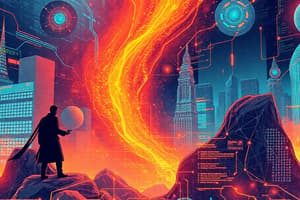Podcast
Questions and Answers
What is an Information System?
What is an Information System?
An organized combination of people, hardware, software, communications networks, and data resources that collects data, transforms it, and disseminates information.
Data is defined as ____.
Data is defined as ____.
raw unorganized facts
Information is a collection of facts organized in such a way that they have ____ value beyond the value of the facts themselves.
Information is a collection of facts organized in such a way that they have ____ value beyond the value of the facts themselves.
additional
What is a Transaction Processing System (TPS)?
What is a Transaction Processing System (TPS)?
Which of the following describes a Decision Support System?
Which of the following describes a Decision Support System?
Which of the following is NOT a component of a Computer Based Information System?
Which of the following is NOT a component of a Computer Based Information System?
E-Commerce refers to business transactions conducted physically at a location.
E-Commerce refers to business transactions conducted physically at a location.
What does M-Commerce rely on?
What does M-Commerce rely on?
Match the business information systems with their functions:
Match the business information systems with their functions:
What is the purpose of Systems Development?
What is the purpose of Systems Development?
The value of information is not linked to how it helps decision-makers achieve their goals.
The value of information is not linked to how it helps decision-makers achieve their goals.
Flashcards are hidden until you start studying
Study Notes
Information Systems Definition
- Information system is a collection of components that gather, process, store, and distribute data and information to monitor performance.
- An information system can also be defined as a combination of people, hardware, software, networks, and data resources that collect, transform, and spread information.
Data vs. Information
- Data is raw and unorganized facts.
- Information is organized data that provides added value beyond the individual facts.
Information System Components
- Process refers to a set of tasks performed to achieve a specific outcome.
- Knowledge is the understanding and awareness of information and its usefulness for specific tasks or decision-making.
The Value of Information
- The value of information is linked to its ability to help decision-makers accomplish organizational goals.
Systems
- System is a collection of components that work together to achieve goals.
Computer-Based Information System
- Hardware refers to the physical components of a computer system.
- Software comprises the computer programs that instruct hardware.
- Databases are organized collections of facts.
- Telecommunications involves electronic signal transmission for communication.
- Networks facilitate distant electronic communication.
- Internet is a network of interconnected networks.
- Intranet is an internal corporate network.
- Extranet is a link between intranets.
- People are the users of a computer-based information system.
- Procedures are strategies, policies, methods, and rules for using a computer-based information system.
Business Information Systems
- E-Commerce refers to business transactions executed electronically.
- M-Commerce involves transactions conducted anytime and anywhere, often relying on wireless communication.
Transaction Processing System (TPS)
- Transaction is a business-related exchange that serves as evidence of a business event.
- TPS records completed business transactions.
- Enterprise Resource Planning (ERP) is a set of integrated programs for managing all business operations.
Management Information Systems (MIS)
- MIS provides routine information to managers and decision-makers.
Decision Support System (DSS)
- DSS is designed to support problem-specific decision making.
Specialized Business Information Systems
-
Artificial Intelligence (AI) makes computers take on human intelligence characteristics.
-
Expert System provides computers with the ability to give suggestions and act like experts in specific fields.
- Knowledge Base holds the data, rules, procedures, and relationships required for achieving value or desired outcomes.
-
Virtual Reality simulates real or imagined environments visually in three dimensions.
Systems Development
- Systems Development involves creating or modifying existing business information systems.
Systems Investigation and Analysis
- Systems Investigation and Analysis focuses on understanding the problem and exploring potential solutions.
Systems Design, Implementation, Maintenance, and Review
- System Design determines how the new system will meet business needs.
- Implementation involves putting the new system into operation.
- Maintenance ensures the system continuously meets changing business needs.
- Review assesses the effectiveness of the system.
General Information Systems Diagram
- Data is raw and unorganized facts.
- Information is organized data that is meaningful to the user given the environment.
- Environment includes factors like business functional areas and computer hardware, software, and other information systems.
- Subsystem is a component within a larger system.
- System Boundary represents the interaction between a system and its environment through an interface.
Information System Activities
- Input of Data Resources involves data entry, editing, making data machine-readable, using source documents (official records of transactions), and user interfaces (how users interact with information).
- Process Data into Information transforms raw data into meaningful information.
- Output of Information delivers information to users.
Informal Information System
- Organizations often have unique cultures that influence how they operate, which includes fundamental assumptions, values, and practices.
Studying That Suits You
Use AI to generate personalized quizzes and flashcards to suit your learning preferences.




